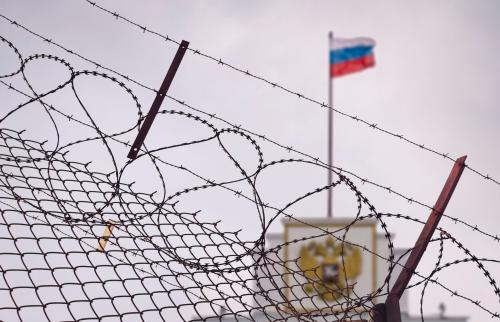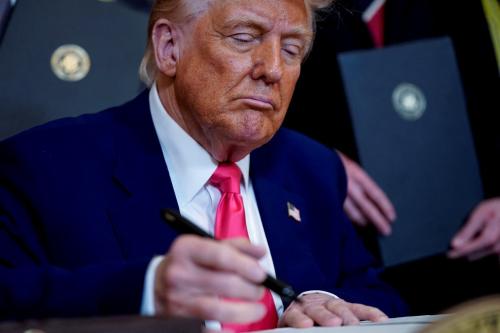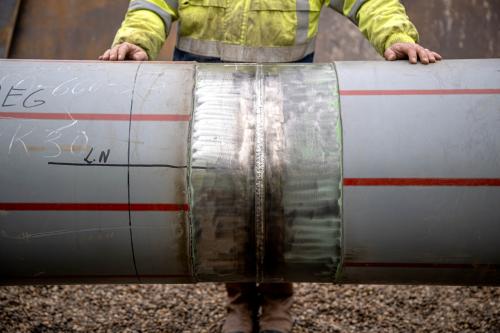Yesterday’s agreement between the central government of Iraq and the Kurdistan Regional Government represents an important step forward for Iraq, although no one should expect that it will actually end the broader differences between Baghdad and Erbil.
At least for now, everybody won. The Kurds will get to sell their oil, will get their 17 percent (theoretically, although only 11-12 percent has ever been delivered) of the Iraqi budget, and will get tacit recognition of their control of Kirkuk. That last point is a big one for the Kurds, who routinely refer to Kirkuk as “their Jerusalem.” The central government gets a functional relationship with the KRG, a Kurdish recommitment to contribute their oil revenues to the national budget, and Kurdish agreement to market all of their oil through the central government’s oil marketing entity, SOMO (for State Oil Marketing Organization). Again, the last was the key concession for the central government.
It’s important to understand why the deal happened now after so many years of stalemate. In essence there were five key developments:
- The Turks nixed Kurdish independence. According to high-ranking Kurdish officials, Ankara signaled to Erbil this fall that Turkey would not support a Kurdish bid for independence. This was a watershed for the Kurds, a bolt from the blue that dashed their hopes for independence in the near term. Since 2012, Turkish Prime Minister (now President) Erdogan had indicated to the Kurds that he supported KRG independence under the right circumstances — a position that made sense for Turkey and the United States, as well as the Kurds. Although the Kurds have differing views regarding Erdogan’s motives for this about face, they now seem convinced and crestfallen, but accepting of the reality. With near-term independence off the table, the Kurds had to work out a viable modus operandi with Baghdad on oil.
- The Kurds are genuinely concerned about their security. DA’SH (or ISIS or ISIL) is not ten feet tall and the Peshmerga were not as bad as they seemed in the first days of August when they were surprised by the sudden DA’SH assault. But neither were they as good as they had once been, and as good as every Kurd believed them to be. When the DA’SH threat suddenly revealed their security to be less than what they believed, it shook the Kurdish leadership to the core. As the Kurds like to point out to Americans, they share the Israeli paranoia over security because they have a similar history of persecution and slaughter as the Jews. Until they feel militarily safe and secure again, it will be hard for them to contemplate independence, and that too pushed them to work out a functional relationship with Baghdad.
- Low oil prices. Both Baghdad and the Kurds are badly squeezed right now by the falling price of oil. Over the past three years, their guerrilla war over oil exports had already been hurting both of them. Major oil companies were wary of investing too heavily in either, the Kurds had difficulty selling their oil, and Baghdad seemed to spend more time trying to diminish KRG exports than it did trying to boost its own. The collapse of the price of oil has forced both of them to set aside those differences and work together to meet their very real financial needs—needs that have further ballooned as a consequence of the war against DA’SH. So if the Turkish reversal undermined the (absolutely critical) diplomatic conditions for KRG independence and the DA’SH threat called into question their security basis for independence, low oil prices have threatened even the economic case for independence.
- Securing the Kirkuk field and its exports put the Kurds in a very strong position over the longer term. If the Turkish reverse put the KRG in a disadvantageous position in the short run, their exploitation of the Kirkuk field and ability to export it and sell it puts them in an advantageous position over the longer term. With Kirkuk, the Kurds can export nearly 500,00 barrels per day (bpd) which would be more than adequate to meet their financial needs if oil were back at around $100 per barrel. As long as oil remains low — and falling — the Kurds won’t be self-sufficient even with the Kirkuk production. However, over the long term the price of oil is likely to rebound and additional fields in the KRG will be brought on line. That means that having Kirkuk firmly under KRG control should allow the Kurds to rebuild the economic foundation for independence at some later date.
- Haidar al-Abadi is a big improvement. It was impressive enough that the Iraqis (with big assists from Iran and the Shia religious leadership in Najaf) were able to replace Nuri al-Maliki as prime minister. It’s even more impressive that they chose Haidar al-Abadi as his replacement. As many Iraqi politicians have put it to me over the past few months, there were many worse candidates available. While it is still far too early to anoint Abadi as Iraq’s savior, there is no longer any question that he is trying hard to do the right thing and has taken a number of important, albeit small, steps in that direction. Sacking many of Maliki’s worst generals, agreeing to form Sunni military units, opposing Hadi al-Ameri as interior minister, and now the deal with the Kurds all demonstrate that Abadi is willing to fight and take risks to do what is necessary to keep pushing Iraq down the path that the United States hopes it will take. The Kurds recognized this and said so frequently in meetings. An important reason they were willing to make the compromises in this deal — compromises they refused to make with Maliki — was because they believe Abadi is trying to do the right thing.
All five of these factors are important and all five of them seem likely to endure for some time to come. That suggests a reasonable basis for Baghdad and Erbil to continue to work together for the foreseeable future.
But we should not expect the Kurdish issue to end there. The Kurds have certainly enjoyed periods where they were more comfortable (or less uncomfortable) as part of Iraq, but overall the history has not been a happy one. For most of the past century, the Kurdish presence within Iraq has been a source of instability and violence on both sides. That’s why it is a shame that the Kurds were not granted independence after the U.S. invasion in 2003, after the DA’SH invasion in June of 2014, or at any point in between. Both the Kurds and the Iraqis would be better off with a divorce as long as it is an amicable one.
What’s more, at least some and perhaps all of the incentives that created the conditions for a deal may prove ephemeral. It is hard to know if the Turks will ever come back around to the idea of accepting Kurdish independence, but there is no reason to believe that there opposition is timeless and immutable. The Kurds are already working diligently to rebuild their military capabilities, and the new deal with Baghdad further facilitates that. The price of oil is likely to rebound at some point, and the Kurds will keep expanding their production and export capacities. And when they do so, having Kirkuk under their belt should make independence economically viable at that point.
Moreover, at some point, Haidar al-Abadi is going to confront the hardest issues facing Iraq, those related to the structure of its government and just how much to decentralize power. The Sunni Arabs have now joined the Kurds in favoring a fairly extreme form of decentralized federalism, but many Shia oppose it. Abadi has been careful not to reveal his own preferences, but it will be difficult for him to convince many in his own community to accept Sunni Arab (and Kurdish) demands. When these issues are joined they could split Iraq’s communities all over again and once again, the Kurds may start contemplating independence again.
The Brookings Institution is committed to quality, independence, and impact.
We are supported by a diverse array of funders. In line with our values and policies, each Brookings publication represents the sole views of its author(s).




Commentary
Five Reasons for the Iraqi-Kurdish Oil Deal
December 3, 2014